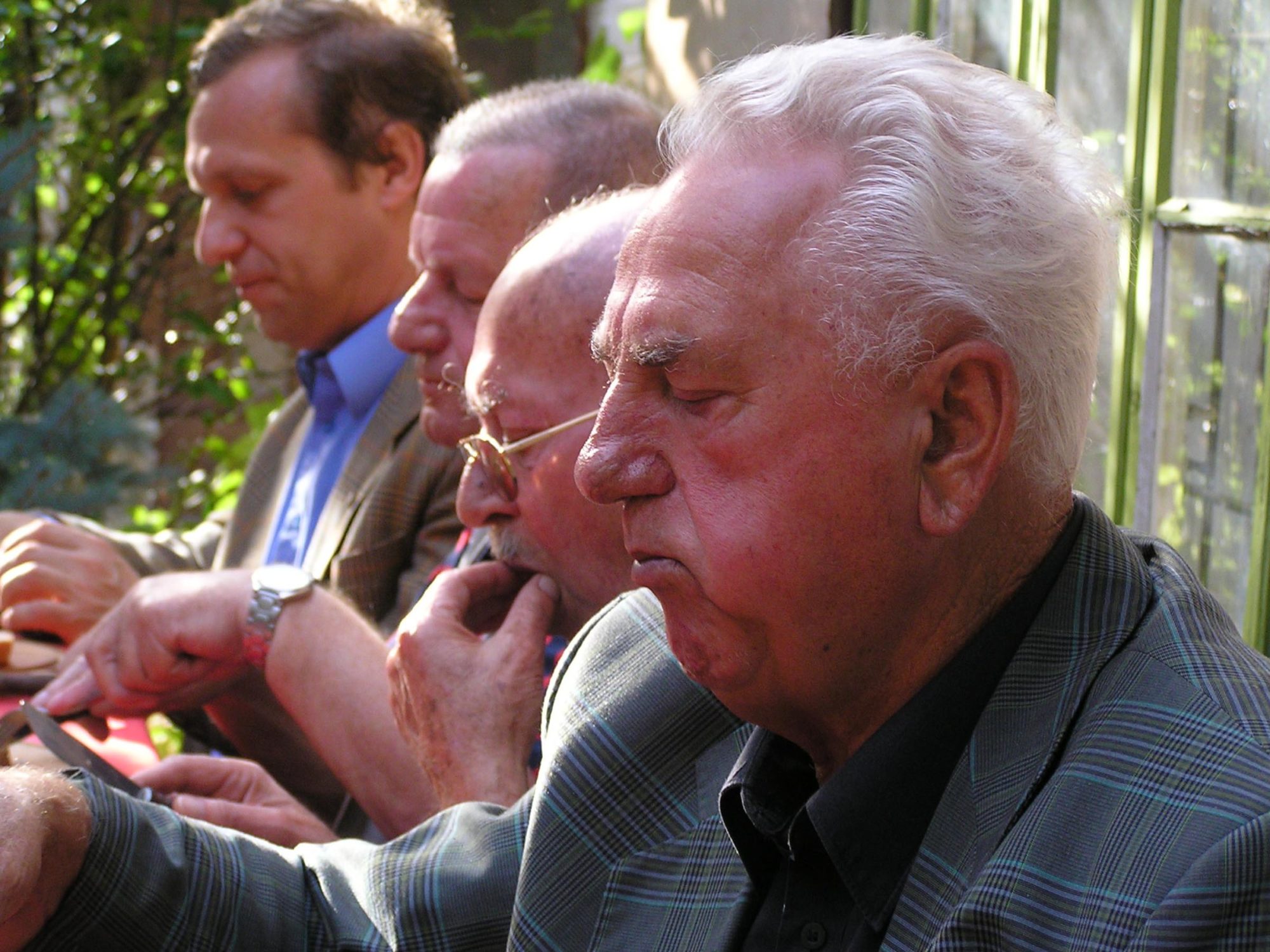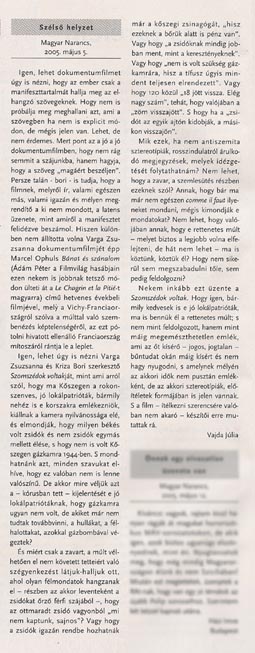Ghetto, brick factory, train station, mass graves – 60 years later the neighbours of the Hungarian Jews remember. What did they do and what could have been done? What did the bystanders see and what do they believe they saw in their small town community during the last days of World War II? The documentary Once They Were Neighbours is about the present as much as it is about history: the shadows cast by the failure to face the past during the last 60 years.
DVCAM, length: 65 min., 2005, Hungary
Hungarian with English subtitles (original title: Szomszédok voltak)
“I don’t like to talk about it. These are bad memories.”
“They were born here. They never thought they would ever leave.”
“It was a topsy-turvy world… The average people could do nothing.”
“We were quite close friends but still, they never told me anything about
what had happened to them over there. I didn’t ask, they didn’t say…”
Once They Were Neighbours – a documentary film by Zsuzsanna Geller-Varga on Vimeo.
We are putting the film on our website publicly, because we want it to be seen by as many people as possible.
If you watched Once They Were Neighbours and found it interesting, please help our further work with your contribution through PayPal.
There is no set price for the film, you decide how much it’s worth for you. Thank you!
| Featuring Gusztáv Harkai Ferenc Horváth Ede Jenkei Ágoston Kosztich Mária Németh András Harkai József Harkai László Kiss Imre Lóránt László Tomai Ferenc Tóthárpád József Tóth Gusztáv Schwahoffer Endre Szerdahelyi Antal VágvölgyiPhotos, archive materials Dániel Berzsenyi Library, Szombathely József Giczy Sr. Ede Jenkei Hungarian National Museum, Photo Archive Széchenyi National Library Könyvtár Wienerberger Brick Factory Corp. Music recorded by |
Instrumentation Egon BalázsNarrator Attila Király Research Post-production Editor Producer and original music Script and interviews Director and cinematographer Supported by © 2005. Metafórum Film, Zsuzsanna Varga |
BORI KRIZA obtained her MA in Sociology and Sociology of Minorities at Eötvös Loránd University (ELTE) in Budapest, Hungary and also studied at the Nationalism Studies Program of the Central European University, Budapest. Currently as a beneficiary of the French Government Scholarship she is a Ph.D. candidate at the Institut dEtudes Politiques de Paris as well as at the Institute of Sociology, ELTE. She participated in numerous research projects; her main research interests include far right political parties and ideologies in Europe, national myths and identity, migration, minorities, xenophobia, anti-Semitism and collective memory. She has published extensively in Hungarian and English, her reports and articles appear regularly in the Hungarian press. Since 1999, as expert, researcher, interviewer, she has contributed to several award winning documentaries treating social issues (Being Decorated, The End of the Road, From Home to Home by Tamás Almási).
BALÁZS WIZNER is the director of METAFORUM Media and Research Center. He graduated as a sociologist, got his Masters degree in Nationalism Studies at CEU (Central European University, Budapest) and has been a Ph.D. student at the Institute of Sociology, Eötvös Loránd University Budapest since 1998. Apart from participating in several research projects and academic activities Balazs Wizner had been the script-writer and co-producer for a short film (Three walks, 2003) and the publisher of two books (A palacsinta hangja The Sound of Pancake. Collected Writings of Gypsy Children from a Ghetto-Village, 1999. A pilóta The pilot. Novel, 2000). His second novel will be published in fall 2005. He was the composer of a theater play and a short film, he plays the trumpet and writes music for his own jazz band. He is currently producing three documentary films.
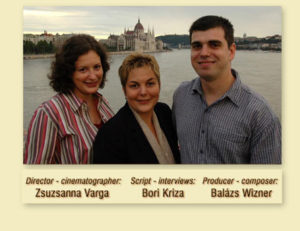
Kőszeg is a picturesque small town surrounded by mountains on the Austrian border of Hungary. A 150 year-old synagogue stands in the heart of the city – abandoned, overgrown with weeds, the gates locked. An old man stops in front of the synagogue and says: “The Jews don’t restore it! Those Jews, they have so much money!” 60 years ago they were neighbours, but today – just like almost anywhere in the countryside – no Jews live here.
The former lager-guard and the man who lived right by the brick factory as a teenager, or the lady who brought food in the ghetto as a young girl have similar memories. They speak admiringly of their former neighbours’ business talent and say that the Germans were to blame for everything.
But were they really…? The film raises difficult questions regarding the actions of average non-Jewish Hungarians while their Jewish neighbours were sent to their death. The people of Kőszeg – along with the entire Hungarian society – have never really faced the past, never taken responsibility, never asked the questions: How did we let it happen? What could have been done?
Presentation of the film on Film.hu (in Hungarian)
” order_by=”sortorder” order_direction=”ASC” returns=”included” maximum_entity_count=”500″]
Press – Translations by Katica Avvakumovits
Hungary: Restoration of the hauntingly beautiful, long-abandoned synagogue in Kőszeg has begun
2020. Oct. 23.
Filmvilág (monthly print magazine)
2014. October – György Báron: There Was Once… Hungarian documentaries about the Holocaust
Click the logo for the article in Hungarian (translation to come).
Broward Jewish Journal (Florida, USA)
2006. 10. 19. Phyllis Steinberg: Film depicts Hungarian Holocaust eyewitnesses
(about Fort Lauderdale Filmfestival)
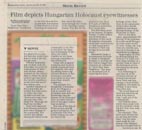
Click the image for a larger view.

PILPUL – an alternative Jewish webzine by Marom Klub Egyesület
2006. 04. 30. Szarka Judit: Tactfulness and accuracy
Viewer’s thoughts about Zsuzsanna Varga’s documentary, Once They Were Neighbours
Click the logo for the article in Hungarian (translation to come).

Élet és Irodalom (a cultural weekly)
2006. 02. 17. Lóránt Stőhr: In Polyphony. About the documentaries of the 37th Hungarian Film Week
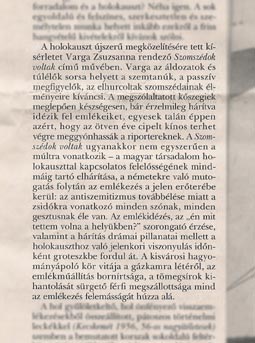 “In the documentary Once They Were Neighbours, director Zsuzsanna Varga has taken a new approach toward the Holocaust. Instead of focusing on victims and survivors, Varga is curious about the eyewitnesses: what was the experience of the bystanders, of those who were neighbors of the deported Jews? The citizens of Kőszeg participating in the interviews are surprisingly willing to share their memories, yet clearly distance themselves from any personal, emotional connection. In some cases, this distancing may be the only way they can finally confess to the reporters the terrible burden they have carried for more than 50 years. Once They Were Neighbours, however, deals not only with the past; it also draws attention to the persistent, present-day denial of Hungarian society’s responsibility for the Holocaust. In the film, declarations blaming the Germans for the crimes serve to spotlight current attitudes: enduring anti-Semitism lends an edge to every word and gesture concerning the Jews. The reminiscences, the troubling question of “What would I have done in their place?”, and dramatic denials are juxtaposed with present-day attitudes toward the Holocaust, and the mixture results in some bizarre and affecting moments. The debate at a local patriotic men’s club over whether a gas chamber ever existed; the small-mindedness surrounding the construction of the Holocaust memorial; the obsessiveness of the man bent upon excavating the mass graves: these scenes all serve to underscore the fact that this community’s experience of dealing with the past remains contradictory and incomplete.”
“In the documentary Once They Were Neighbours, director Zsuzsanna Varga has taken a new approach toward the Holocaust. Instead of focusing on victims and survivors, Varga is curious about the eyewitnesses: what was the experience of the bystanders, of those who were neighbors of the deported Jews? The citizens of Kőszeg participating in the interviews are surprisingly willing to share their memories, yet clearly distance themselves from any personal, emotional connection. In some cases, this distancing may be the only way they can finally confess to the reporters the terrible burden they have carried for more than 50 years. Once They Were Neighbours, however, deals not only with the past; it also draws attention to the persistent, present-day denial of Hungarian society’s responsibility for the Holocaust. In the film, declarations blaming the Germans for the crimes serve to spotlight current attitudes: enduring anti-Semitism lends an edge to every word and gesture concerning the Jews. The reminiscences, the troubling question of “What would I have done in their place?”, and dramatic denials are juxtaposed with present-day attitudes toward the Holocaust, and the mixture results in some bizarre and affecting moments. The debate at a local patriotic men’s club over whether a gas chamber ever existed; the small-mindedness surrounding the construction of the Holocaust memorial; the obsessiveness of the man bent upon excavating the mass graves: these scenes all serve to underscore the fact that this community’s experience of dealing with the past remains contradictory and incomplete.”
Click the image to read article (in Hungarian).
Film.hu (Hungarian film industry website)
2006. 01. 30. András Surányi: Group Therapy – analysis
“Zsuzsanna Varga: Once They Were Neighbours – A brave and very sensitive film, in which the filmmaker is able to depict the everyday nature of horror, in which horror’s totality builds up from the seemingly weightless gestures of our small betrayals and our tiny helplessnesses.”
Click the logo for the full article (in Hungarian).
![]()
Filmkultúra (Hungarian website – film related news, interviews, critiques)
2006. 02. 01. Lóránt Stőhr: Keeping Their Distance. Interview with director Zsuzsanna Varga
Click here for the translation.
Click the logo for the full article (in Hungarian).

Magyar Narancs (Hungarian print weekly)
2005. 05. 05. Erzsébet Bori: On the Sidelines. Review of the documentary
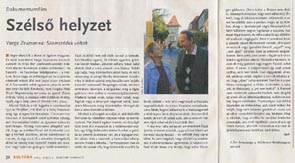
Click the article for full size (in Hungarian) or the logo for the online version.
Click here for the translation.

Magyar Narancs (Hungarian print weekly)
2005. 05. 19. On the Sidelines – A commentary in response to “On the sidelines,” a review of Zsuzsanna Varga’s film “Once They Were Neighbours,” by Erzsebet Bori [borie], published on 2005. 05. 05. in Magyar Narancs. By Júlia Vajda
Click the article for full size (in Hungarian).
Click here for the translation.

Nők Lapja Évszakok (Hungarian monthly magazine)
2005. June
Marcsi Fodor: Such a Life
Like in the Movies. Professional portrait of Zsuzsanna Varga
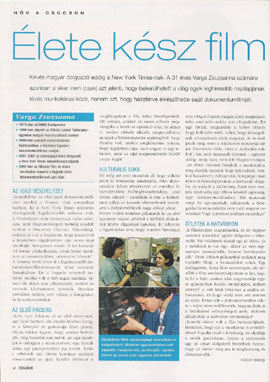
Click the article for full size (in Hungarian).
Click here for the translation.
Film.hu (Hungarian film industry website)
2005. 05. 23. Emese Szlanárs: At the Last Minute – Interview with Zsuzsanna Varga
Click the logo for the full article (in Hungarian).
Click here for the translation.

Klubrádió (Hungarian commercial radio channel)
2005. 07. 30. Zsuzsa Kun and Kristóf Németh: Klubdélelott (Cultural Talk Show) – Interview with Zsuzsanna Varga
(translation to come)
official selection – 2006. January 31. – February 7.
Big Sky Documentary Film Festival – Missoula, Montana (USA)
official selection – 2006. February 16 – 22.
3rd Film.dok Hungarian – Romanian Documentary Film Festival – Miercurea Ciuc, Romania
official selection – 2006. May 22-28.
30th Atlanta Film Festival – Atlanta, GA (USA)
official selection – 2006. June 9-17.
19th Dallas Video Festival – Dallas, TX (USA)
official selection – 2006. August 10, 9:00 PM
3. Cinefest Miskolc – International Festival of Young Filmmakers – Miskolc, Hungary
Duna Television’s Special Award – 2006. September 16-23.
IV. Jewish Festival of Szombathely – Szombathely, Hungary
2006. September 13. 18:00 Savaria Cinema
2006 Berkeley Film & Video Festival – Berkeley, CA (USA)
Honorable Mention Award – 2006. October 6-8.
21st Fort Lauderdale International Film Festival – Fort Lauderdale, FL (USA)
official selection – 2006. October 16 – November 14.
2006 Jewish Eye World Jewish Film Festival – Beer Sheva, Israel
official selection – 2006. November
Duna TV (public service TV) – 2007. January 15. Monday 22:25
Duna TV – 2007. March. 16. Friday 4:45
Duna II. – 2007. March 18. Sunday 15:50
Kamera Hungária 2007 Television Program Festival – Pécs, Hungary
finalist – 2007. March. 29. – Apr. 1.
M2 (public service TV) – 2008. February 13. Wednesday 14:35
M2 – 2009. January 29. Thursday 23:15
